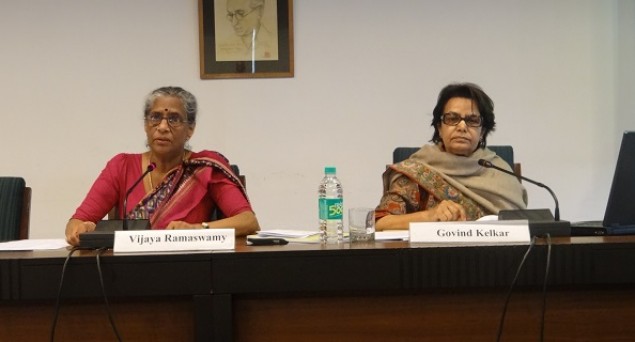By Atif Jaleel, India Tomorrow,
New Delhi, 13 March 2014: Renowned researcher Dr. Govind Kelkar, in a seminar on gender regimes and women’s economic empowerment, advocated landownership to women as an attempt to curb gender-based violence. According to her study, “landownership results in significant reduction in gender-based violence.”
As part of a seminar series on ‘India in Transition’ at Nehru Memorial Museum and Library (NMML), New Delhi, on 12 March, Dr. Govind Kelkar, Senior Advisor at Landesa/Rural Development Institute and Senior Fellow at International Centre for Research on Women, New Delhi, spoke about women’s economic empowerment under the topic ‘Gender Regimes and Women at the Threshold of Economic Empowerment’.
Dr. Kelkar’s research focused on two key economic sectors: Agriculture and Information Technology (IT).
According to her research, 70 to 80% workers in agriculture are women. Out of that less than 10% women have ownership or control rights over land, citing a lack of say in matters related to land on which most women work on. Therefore in her research, she concluded that landownership would be beneficial for women.
Many policy changes in India have helped women, citing the 2% to 5% reduction in stamp duty of landownership in women’s name has made some kind of change, since people want to save money; it has in turn brought power in the hands of women as landowners.
The paper also discussed transformative changes towards economic empowerment in policy and practice with attention to unmediated asset distribution and capability development, which would help overcome gender-based barriers in the economic empowerment of women.
According to Dr. Kelkar, capability development is not just the upgrading of technical skills; it is a combination of knowledge, skill and effective possession or ownership of productive assets that can be translated into transforming social attitudes and actions, thereby bringing change in gender regimes.
She said, “It is not just upgrading of the technical skills. That is not capability development only. Capability development is also about combining skills and effective ownership of productive assets that can be translated into transforming social attitudes and action.”
“When you have property, when you have land then social norms come down. They lose their power,” Dr. Kelkar continued.
As far as the IT industry is concerned, 28% women are part of the industry, higher than the national labour participation rate of women. According to Dr. Kalker, “With the spread of IT, and more so with mobile phone technology, women have learned new methods of work organization.” This therefore, had given women more opportunity to assert power.
On the topic of gender identities, she pointed out the discrimination of gender identities in skilled and non-skilled work for women. Where certain work was considered as “non-skilled work” for women, whereas the same is considered as “skilled work”.
As per the identity economics model of the labour market, Dr. Kelkar cited that certain types of work is now considered as work only for women. “Garment work has been associated with women. Even agriculture has also come to be considered a feminized work,” she said.
Giving a personal observation, Dr. Kelkar noticed that in garment work, chikan embroidery or embroidery that involved golden threads, would be done by men and considered ‘skilled work’, therefore it is paid more, whereas all other embroidery is done by women and is known as ‘unskilled work’.
Talking about the pace of change in women’s issues, Dr. Kelkar said that “patriarchal and social norms are slow moving institutions. Laws and policies are relatively fast moving institutions. When you pass a law, you also know that they will not be implemented.”
“But what is important is, slow moving institutions they exercise causal pressures on fast moving institutions. They allow or disallow the implementation policies. So there is a need to really address the linkages,” she said.
In conclusion, Dr. Kalker saw that there was a “significant improvement in position of women in non-economic domain, within the home and in the social cultural space has to be seen as the integral part of the economic domain.”
When asked about what she thought of land rights in Islamic and Hindu feminism, she responded that she favoured Islamic feminism, as women got at least some kind of land rights in contrast to Hindu feminism.





